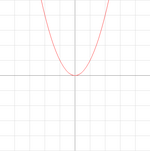Difference between revisions of "Parabola"
m |
|||
| Line 42: | Line 42: | ||
</asy></center> | </asy></center> | ||
<br /><br /><br /><br /><br /><br /><br /><br /><br /> | <br /><br /><br /><br /><br /><br /><br /><br /><br /> | ||
| + | |||
| + | |||
| + | ==Video Description== | ||
| + | https://youtu.be/Res-cddhRLw?si=a2XGd_hkEArrwOVG | ||
| + | |||
| + | ~MathProblemSolvingSkills.com | ||
| + | |||
| + | |||
==Problems== | ==Problems== | ||
Latest revision as of 15:22, 13 September 2023
A parabola is a type of conic section. A parabola is a locus of points that are equidistant from a point (the focus) and a line (the directrix).
Contents
Parabola Equations
There are several "standard" ways to write the equation of a parabola. The first is polynomial form: ![]() where a, b, and c are constants. This is useful for manipulating the polynomial.
where a, b, and c are constants. This is useful for manipulating the polynomial.
The second is completed square form, or ![]() where a, h, and k are constants and the vertex is (h,k). This is very useful for graphing the quadratic because the vertex and stretching factor are immediately before you.
where a, h, and k are constants and the vertex is (h,k). This is very useful for graphing the quadratic because the vertex and stretching factor are immediately before you.
The third way is the conic section form, or ![]()
![]() or
or ![]() where the p is a constant, and is the distance from the focus to the vertex.
where the p is a constant, and is the distance from the focus to the vertex.
Graphing Parabolas
Using the completed square form, ![]() or
or ![]() , the vertex of the graph is at the point
, the vertex of the graph is at the point ![]() . The graph appears vertically if the
. The graph appears vertically if the ![]() term is squared, and horizontal if the
term is squared, and horizontal if the ![]() term is squared. The graph will be oriented (opens up) upwards/right if
term is squared. The graph will be oriented (opens up) upwards/right if ![]() is positive, and will be downwards/left if
is positive, and will be downwards/left if ![]() is negative.
Here are the graphs of a few parabolas:
is negative.
Here are the graphs of a few parabolas:
![[asy] import graph; size(300); Label f; f.p=fontsize(6); xaxis(-9,9,Ticks(f, 1.0)); yaxis(-9,9,Ticks(f, 1.0)); real f(real x) { return 3x^2-14x+8; } draw(graph(f,(7+2*sqrt(13))/3,(7-2*sqrt(13))/3),red+linewidth(1)); [/asy]](http://latex.artofproblemsolving.com/e/f/0/ef05cddb62e9f4a3185f556405ec61a88c1c91b7.png)
![[asy] import graph; size(300); Label f; f.p=fontsize(6); xaxis(-8,8,Ticks(f, 2.0)); yaxis(-8,8,Ticks(f, 2.0)); real f(real x) { return -x^2+2x+2; } draw(graph(f,1-sqrt(11),1+sqrt(11)),green+linewidth(1)); [/asy]](http://latex.artofproblemsolving.com/c/0/d/c0d9ba587243d9b1155bf2e547df7685ebabd990.png)
Video Description
https://youtu.be/Res-cddhRLw?si=a2XGd_hkEArrwOVG
~MathProblemSolvingSkills.com
Problems
Introductory
- A parabola with equation
 passes through the points (2,3) and (4,3). What is
passes through the points (2,3) and (4,3). What is  ?
?
Intermediate
Suppose that a parabola has vertex ![]() and equation
and equation ![]() , where
, where ![]() and
and ![]() is an integer. The minimum possible value of
is an integer. The minimum possible value of ![]() can be written in the form
can be written in the form ![]() where
where ![]() and
and ![]() are relatively prime positive integers. Find
are relatively prime positive integers. Find ![]() .
.
Olympiad
Find the area of the largest triangle ![]() [and prove this is the maximum] whose interior is entirely within the region bounded by
[and prove this is the maximum] whose interior is entirely within the region bounded by ![]() and
and ![]() .
.










